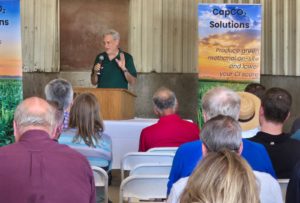 The Renewable Fuels Association was on-site at the 2025 Farm Progress Show this week in Decatur, Illinois to talk about the latest ethanol news and moving to higher blends.
The Renewable Fuels Association was on-site at the 2025 Farm Progress Show this week in Decatur, Illinois to talk about the latest ethanol news and moving to higher blends.
The RFA display near the media tent attracted attention with a new 2025 Chevrolet Trax flex fuel vehicle on display as well as an FFV conversion kit to discuss the ease of switching over a conventional vehicle to flex fuel.
 RFA President and CEO Geoff Cooper; Robert White, Senior Vice President for Industry Relations and Market Development; and Jared Mullendore, Policy Counsel and Director of Government Affairs, all were on-hand to talk with show attendees and the media.
RFA President and CEO Geoff Cooper; Robert White, Senior Vice President for Industry Relations and Market Development; and Jared Mullendore, Policy Counsel and Director of Government Affairs, all were on-hand to talk with show attendees and the media.
Cooper discussed EPA’s latest announcement on small refinery exemptions and how boosting ethanol markets can help farmers deal with a large crop and low prices. White talked about bringing E15 to California, and how RFA is helping prepare fuel retailers, as well as the critical importance of legislation allowing year-round E15 sales nationwide, while Mullendore showed off the vehicles on display and shared how farmers can convert their own vehicles to run on higher ethanol blends.
FPS25 Interview with RFA President and CEO Geoff Cooper (10:43) FPS25 Interview with Robert White, RFA (6:46) FPS25 Interview with Jared Mullendore, RFA (4:57)










